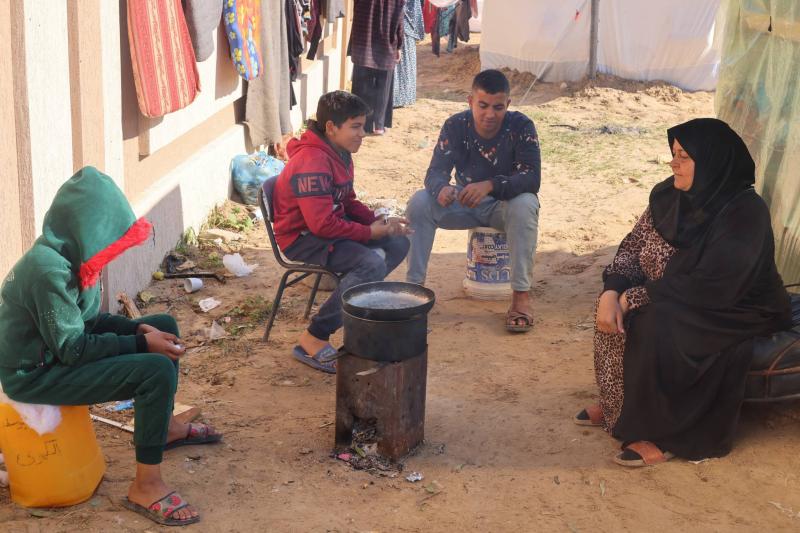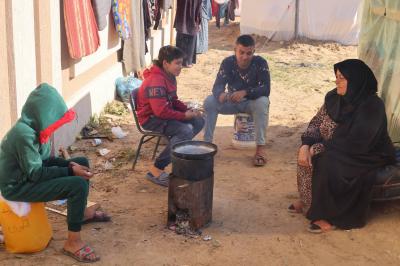A document from the Egyptian Red Crescent, reviewed by Reuters and sources in Gaza, revealed that Israel prevented the entry of various supplies into the region via aid trucks, including water purification devices, medical supplies, and tent poles. However, Israel denied blocking any of these items. Israel inspects trucks heading to the Palestinian territory to prevent the entry of items it considers to have a possible "dual use" - civilian or military - based on a policy it has implemented long before Hamas's attack on Israel and the subsequent war in Gaza.
Determining which supplies are allowed entry has become increasingly urgent and contentious as the war has progressed. The conflict has led to the displacement of most of Gaza's residents and has caused severe shortages of food, water, medicine, and other basic necessities. The Egyptian Red Crescent document, dated mid-December, detailed restrictions on the entry of 1,200 water purification devices, 100 oxygen cylinders, one oxygen generator, 1,000 solar-powered units, 24 energy generators, and 418 medical supplies since the war began.
The Coordinator of Government Activities in the Territories (COGAT), a body of the Israeli Defense Ministry that coordinates aid deliveries with the United Nations and humanitarian organizations, disputed this, stating it was untrue. Colonel Elad Gorin from COGAT said at a press conference, "We do not deny anything under four main categories: food, water, medical supplies, and shelters. All these items enter daily."
COGAT reported that 11,220 tons of medical supplies, including X-ray machines, CT scanners, and oxygen generators for hospitals, have entered Gaza, along with purification units for a desalination station and other portable purification units. However, doctors at hospitals in Gaza stated that equipment such as oxygen cylinders and X-ray machines was not reaching them despite critical needs. They attributed this to Israeli inspections without specifying how they knew that.
An anonymous humanitarian worker from an international relief organization acknowledged that certain types of medical equipment, including X-ray machines, "cause problems." A former Israeli government advisor on Palestinian affairs, Kobi Michael, suggested that inspections have likely tightened since the onset of the war compared to the more lenient system previously in place over the years. Michael, currently a senior researcher at Tel Aviv University's Institute for National Security Studies, explained, "I think what worries Israeli inspectors the most right now is what equipment could enable Hamas to extend its time underground." He added, "Israel wants to shorten the duration of this war, which means reducing the time Hamas can spend underground."
The Egyptian Red Crescent document was delivered to a group of European parliamentarians during their visit to the Egyptian city of Al-Arish, where aid trucks are loaded, and the Rafah crossing, through which aid enters Gaza. Spanish parliamentarian Soraya Rodríguez later provided the document to Reuters. Rodríguez and her Irish colleague Barry Andrews noted during their visit that, in some instances but not all, Israeli inspectors inexplicably excluded tent poles. Andrews remarked, "How can this be militarily usable?... It's very difficult to understand."
COGAT stated that Israel has no plan to exclude tent poles and that 13,490 tons of supplies designated for shelters, including tent poles, have entered Gaza during the war on 923 trucks. In Rafah within the Gaza Strip, Reuters reporters observed a pile of what resembled thick cloth tents lying on the ground in a corner of Al-Kuwait Hospital. Dr. Suhaib Al-Hams, the hospital director, indicated that the tents were left in that state because they were delivered without poles. A Gaza social affairs ministry official confirmed awareness of about 150 tents arriving without poles among 30 trucks loaded with tents.
Ashraf Abu Sakran, a construction worker displaced from his home in Gaza City, rejected an offer to receive a tent without poles. Instead, he purchased some thin wood and tarpaulin and constructed a shelter in Rafah, where he currently lives with his wife and five children, one of whom has a disability. He said, "Where am I supposed to find metal poles?... We lost our home, and we can't even find a decent tent."
The confusion regarding whether Israel is blocking certain items due to dual-use concerns or whether they are not reaching Gaza for other reasons may stem from the lack of a publicly available list of specific dual-use items. When asked by Reuters for such a list, COGAT referred to one dated from 2008 available online. This list includes ten categories of items such as communications, electronics, advanced materials, security, and information technology.
An Israeli official familiar with the matter, who requested anonymity, cited fertilizers that could be used to make explosives, iron that might be used in rocket manufacturing, and materials necessary for drilling equipment as examples of dual-use materials. The official added, "Without that, we cannot expand and risk giving terrorist groups ideas about what to do with such materials."




